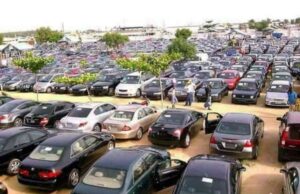Recent investigations carried out by our correspondents at two biggest vehicle terminals in Lagos as well as the popular Berger Auto Market Apapa have revealed that a high percentage of vehicles coming into Nigeria are in violation of federal government’s automotive policy.

Even though government had in 2010 raised the age limit of vehicles to be imported into the country from 10 years to 15 years, investigations also revealed that the Nigeria Customs Service is deliberately violating this trade policy of the federal government by clearing older vehicles from the ports.
Going by the government directive, vehicles manufactured in 2006 and below are not supposed to be cleared by the Nigeria Customs Service.
Confirming the influx of over-aged vehicles, General Manager of PTML Terminal, Mr Tunde Keshinro had in an interview with this newspaper confirmed that the terminal is flooded with damaged, ‘accidented’ and relatively low grade vehicles.
He said here have been more of this grade of vehicles since the auto policy came into being.
Keshinro confirmed that importers now bring in low grade, salvaged vehicles, and these are equally older models rather than newer models. He said, relatively, majority of the vehicles being imported were manufactured before 2010.
It is a surprise that rather than see more of newer vehicles of 2013, 2015, 2017 and 2019, what comes in are vehicles that have one defect or the other and which are much older than the prescribed age bracket. It has also been confirmed that, Customs officers release vehicles of 2003, 2004.
Prior to recent time, the challenge was that Nigerian importers were using Cotonou port in Benin Republic to smuggle vehicles into the country through illegal routes around Seme and Idiroko borders.
According to statistics released by the National Bureau of Statistics (NBS), a total of 1,216,131 used and new vehicles were imported into the country from 2012 to 2017.
The Bureau, in a report tagged, “Nigerian Ports Statistics, 2012 to 2017”, stated that the vehicles came through, Apapa, Tin Can, Onne, Calabar and Delta ports.
According to the NBS, the total worth of used vehicles Nigeria imported between January and September 2021 is N531.7 billion.
The report showed that vehicle importation into the country nose-dived in 2013, even though the federal government auto policy was introduced in 2014 by former President Goodluck Jonathan, with the aim of boosting local production.
According to the bureau, the auto policy led to a hike in tariff, leading to a reduction in the number of vehicles brought into the country.
Sadly, the policy has failed to boost local production but instead fuelled smuggling through neighbouring Benin Republic.
But, apparently convinced about large scale smuggling of used vehicles and loss of revenue, President Muhammadu Buhari, in December 2016 further touched the auto policy by placing a ban on importation of vehicles through the land border.
In between the time that the auto policy was formulated and now, a lot of issues, relating to policies and government interventions have come up.
Some of the policy directives have had to do with adjustment and re-adjustment of import duty on categories of vehicles to be imported.
After almost eight years of test-running the policy, it is now obvious that a review is necessary. Rather than a reduction in duty or review of the age of used vehicles that can be imported, we call for a holistic review of the automotive policy.
We recall that at the peak of its campaign in 2015, before the general elections, the All Progressives Congress (APC) promised to review the policy. It is instructive that its Vice Presidential Candidate then; Prof YemiOsinbajo pointed said that the policy would not only ne reviewed, but that duty would also be reduced.
It is even shocking to say the least that, the automotive policy does not have the backing of the law. This much has been confirmed by the Director-General of the auto policy implementing agency; the National Automotive Design and Development Council (NADDC), Mr Jelani Aliyu.
He said legislating the automotive policy will strengthen it, as well as prevent it from being changed by subsequent governments.
Unknown to many, the auto policy is not just about importation of vehicles. It is more about developing the nation’s indigenous capacity and enhancing the growth of auto assembly plants in the country.
From available data, Nigeria produces less than 10 per cent of the vehicles used in the country. Primarily, a few companies like Hyundai and Honda assemble in Nigeria; the parts are imported as knock-down and not produced in the country.
The Federal government initiated the Automotive Policy in a bid to provide a framework that will support automobile companies, boost local content and establish a vehicle financing scheme that would provide funds for citizens to buy new cars.
The NAIDP represents government’s boldest step at reviving local car assembly in over three decades. The policy seeks to encourage local manufacture of vehicles while phasing out the importation of used vehicles.
Other motives of the policy include job creation, stimulation of the value chain, diversification of the economy, provision of affordable vehicles for the average Nigerian, as well as boosting foreign direct investment into the country.
In trying to implement the automotive policy, the National Automotive Design and Development Council (NADDC) increased tariff on importation of new vehicles to 70 per cent as a way of discouraging Nigerians from buying vehicles from outside the country.
Read Also: What is your assessment of the Federal Government’s Automotive Policy?
But, the objective of the policy has been largely defeated, owing to the apparent seriousness of the part of the Federal Government.
We recall that, the Federal Government through National Automotive Design and Development Council (NADDC) had promised to establish three automotive industrial parks and three automotive testing centres in Zaria, Enugu and Lagos. These still remain promises.
We need to also stress here that, the high tariff structure introduced on imported second-hand vehicles at 70 per cent levy and duty, was not aimed at boosting government’s revenue, but at discouraging importation and attracting more investments in local production.
But, this has also not achieved its purpose, going by the huge volume of sued vehicles that come into the ports.
What is however apparent is the fact that importers of used vehicles have now resorted to importation of used vehicles that are either over-aged or that have been involved in accident or that have been damaged by natural disaster. The apparent aim of the importers is to pay less duty and with their ever-ready collaborators in Customs uniform, they get away with it. Sometime, without the mandatory Salvage Certificate, they pay far less duty than the 70 percent.
Enacting the law that will legitimize the auto policy will encourage auto manufacturers to continue to increase the level of their investments in the country. Enforcing the age restriction on importation of used vehicles is the way to go.
Kindly like us on Facebook
















Discussion about this post